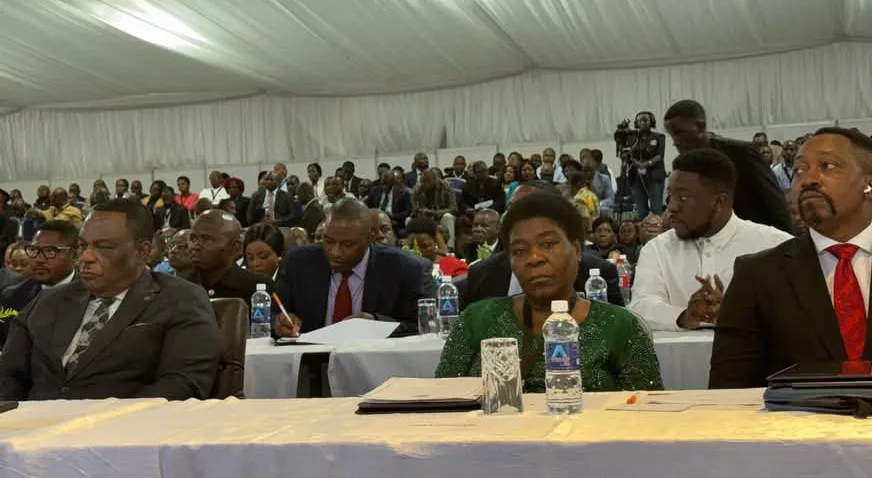|
Getting your Trinity Audio player ready...
|
Vice President Constantino Chiwenga has said a competitive industrial sector is not only vital for unlocking Zimbabwe’s full economic potential but also pivotal in securing Zimbabwe’s rightful place within regional and global value chains.
He made the remarks while officiating at the 65th Zimbabwe International Trade Fair (ZITF) International Business Conference in Bulawayo on Wednesday 23 April 2025 held under the timely and compelling theme: “Revitalising Industrialisation for Zimbabwe’s Economic Resurgence.”
“This theme speaks to the urgent imperative of reinvigorating our industrial base. It underscores that a dynamic, modernised, and globally competitive industrial sector is not only vital for unlocking Zimbabwe’s full economic potential but also pivotal in securing our rightful place within regional and global value chains,” Vice President Chiwenga said.
The platform brings together government leaders, policy-makers, academics, and industry experts to engage in critical dialogue on economic development, industrialization, and emerging global business issues.
The VP said the collective quest to transform the Zimbabwean economy hinges on the establishment of a robust industrial base, one that serves as a cornerstone for sustained and inclusive economic growth.
“Global economic history reminds us that no nation has ever attained high-income status without first laying the foundations of a strong, diverse, and competitive industrial sector.
“Under the Second Republic, Zimbabwe has made commendable progress in advancing industrialisation through the National Development Strategy 1, which has contributed significantly to economic recovery and macroeconomic stability. As we now transition into the implementation of National Development Strategy 2, our focus must shift decisively from low-value, low-technology manufacturing toward high-value, technology-intensive, and knowledge-driven production systems,” VP Chiwenga said.
He added that the transition is firmly anchored in the Zimbabwe National Industrial Development Policy (2024–2030) and the Zimbabwe Industrialisation and Resilience Growth Plan. These strategic frameworks provide a clear roadmap for enhancing value addition, increasing industrial output, and strengthening intersectoral linkages.
To achieve this vision, he said the President, His Excellency, Dr. Emmerson Dambudzo Mnangagwa, has directed the adoption of the Whole-of-Government and Sector Approach, which emphasizes collaboration across Government departments, industry, and academia. This integrated paradigm is essential for addressing current economic challenges and laying the foundation for sustainable industrial growth.
Following the recent Competitiveness Summit held in Bulawayo, the Government developed a Competitiveness Call to Action, bringing together various Ministries, Departments, and Agencies to monitor and accelerate regulatory reforms. This initiative is critical to improving the ease of doing business, fostering business confidence, and attracting both domestic and foreign investment.
On Tuesday, he addressed the Inaugural Research Indaba, jointly hosted by the Research Council of Zimbabwe (RCZ) and the Zimbabwe International Trade Fair (ZITF) under the theme, “Research for Sustainable Industrialisation and Economic Development.”
VP Chiwenga commended the RCZ and ZITF for joining forces to organize the event at a time when Zimbabwe is championing research and innovation as pivotal drivers of economic transformation.
The event and its theme were both timely and critical as the country navigates the 21st-century economic landscape. Participants reflected on how research and innovation could serve as catalysts for Zimbabwe’s journey towards sustainable industrialisation and robust economic development.
It was a poignant reminder of the indispensable role research and innovation play in realizing Zimbabwe’s Vision 2030. In a world grappling with unprecedented challenges—from climate change to economic inequality—research emerges as the cornerstone for developing solutions to confront these issues head-on.
Along the path to economic stabilization and recovery Zimbabwe has contended with significant obstacles, including global economic shocks, disrupted supply chains, and the lingering effects of the Covid 19 pandemic. Yet, amidst adversity, opportunities abound.
‘Research and innovation are the keys to unlocking these opportunities. In an ever-changing global landscape, industries that rely solely on traditional methods are at risk of stagnation. Already, Zimbabwe has witnessed the transformative power of research in agriculture, with advancements such as climate-smart technologies and improved farming techniques yielding resilient and productive systems. I urge all of us here to apply this same spirit of innovation across all sectors—mining, manufacturing, technology, and services—by embracing digitalization, enhancing technological infrastructure, and fostering an entrepreneurial ecosystem.
“Through research we gain insights, discover emerging opportunities, and craft solutions that shape the industries of the future. In the context of sustainable industrialisation, research is not merely a growth tool but a critical instrument for fostering environmentally responsible, socially inclusive, and economically viable development,”Vice President Chiwenga added.






